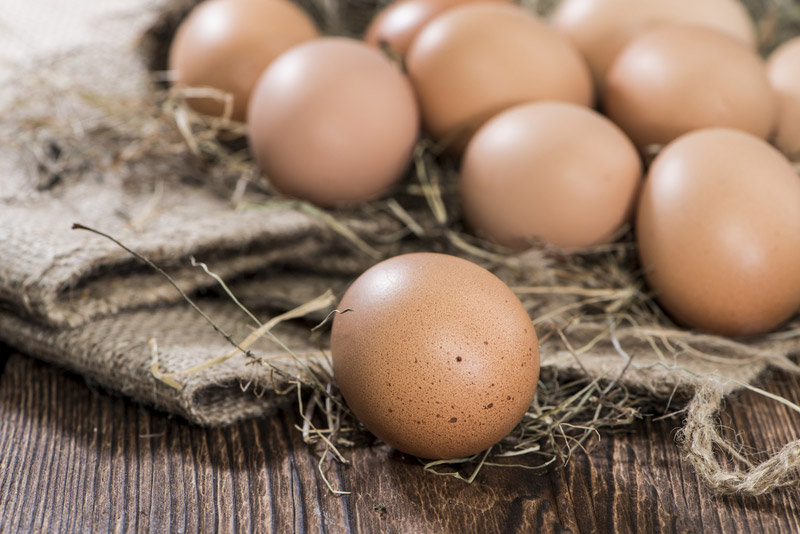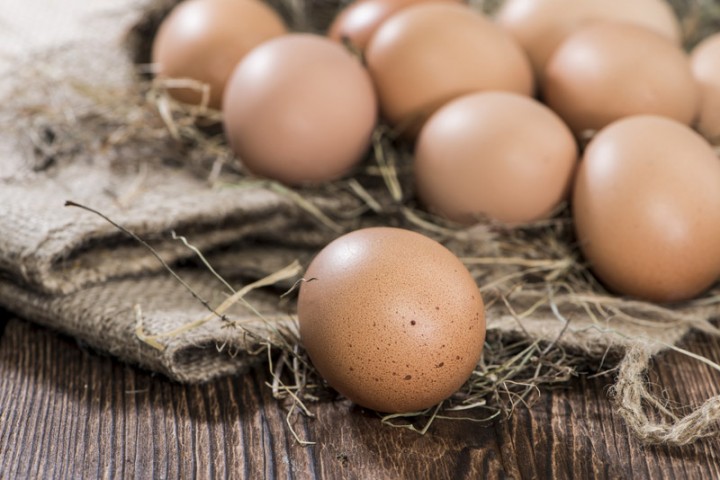Are Brown Eggs the Only Local Eggs? | The Brown Eggs vs. White Eggs “War of the Eggs”
For generations we New Englanders just assumed that our neighbors shared our preference for brown eggs. All the while the heretical white egg was making in roads along our southern border.

Coffee By Design | Portland, Maine
Photo Credit : Katherine Keenan
Brown Eggs vs. White Eggs “War of the Eggs”
There’s been a war raging in New England not generally recognized by those who take part in it every time they crack an egg into a frying pan. Whether an egg has a brown or white shell may not seem to be a matter of world-shaking significance, but it is well to remember that a shooting war broke out among the Lilliputians over whether the morning egg should be opened at the big end or small end of the shell. Already we are a country divided by brown eggs vs. white eggs here in New England — while the rest of us insist by a margin of 9 to 1 that brown eggs are aesthetically, morally, and gastronomically superior, Connecticut residents are evenly divided in their preference, splitting geographically at the Connecticut River. The brown-egg eaters east of the river will therefore be considered as belonging to New England eggwise, while the white-egg eaters west of the river for the moment will have to be regarded as allied to New York, and for that matter, to pretty much the rest of the United States in the brown eggs vs. white eggs controversy.
This puts me somewhat on the spot as a transplanted Vermonter living in enemy territory, so to speak, since I live west of the Connecticut River, if only by a few miles. My taste in eggs was irrevocably determined by my boyhood experiences. We didn’t buy eggs at the grocery store; they were delivered to us twice a week by a farmer. These eggs were brown and they were fresh. White eggs were sometimes available at the grocery store, usually in time for Easter. They were called cold storage eggs, not really edible, but they were thought to be indispensable for Easter egg coloring. As I remember, the eggs were hard-boiled (it seemed the safe thing to do, my parents thought) and were dipped into a dye solution that reeked of vinegar. And there the connection was made; to this day I cannot see a white-egg display in a supermarket without smelling vinegar. This is my cue to look for some brown eggs, and in this border territory they can be found, although they cost perhaps three cents a dozen more. Of course I didn’t know it at the time, but the cultural commitment to brown eggs was one of the oldest elements of my Yankee heritage. The Chinese were the first egg producers, and their chickens, which laid brown eggs, were brought to New England aboard Yankee clipper ships which had visited ports in China and Indonesia. These birds were recognized for their vigor and stamina and soon became invaluable to the colonists. In the early 1800s a thriving poultry industry developed at Little Compton, Rhode Island, and here originated the famous Rhode Island Red, one of the first domestic brown-egg breeds. This breed was further developed into the New Hampshire Red. Today one of the most favored brown-egg layers is the Silver Cross, the result of mating a Rhode Island Red rooster with a Barred Plymouth Rock hen. E. B. White in one of his essays says of this bird: “Her egg is so richly brown, so wondrously beautiful as to defy description.” Why, then, if brown eggs are so much a part of our history in New England, so desirable, should the brown-egg industry feel threatened by white eggs? Don’t we have the courage of our convictions? Are brown eggs losing ground? [text_ad] The brown eggs vs. white eggs answer lies in the realm of economics. Brown-egg layers are bigger, sturdier birds. They eat more, and transportation costs make feed more expensive in the East. Add to the cheaper grain costs in the West and South the White Leghorn hen, described by E. B. White as the greatest egg-machine on two legs, and the only conclusion one can arrive at is that supermarkets can bring white eggs into New England and undersell brown eggs by anywhere from three to ten cents a dozen. New England brown-egg producers are doing what they can to lower production costs. In the meantime, the battle goes on. The egg producers of Maine, New Hampshire, and Massachusetts agree on one point: New England’s egg production from seven million laying hens (excluding white-egg Connecticut) would be just about right for New England’s 7.8 million residents (excluding Connecticut), if consumers would remain loyal to brown eggs. It was evident that what was needed was a strong advertising campaign charged with the responsibility of waging more aggressive war against white eggs. What emerged was the New England Brown Egg Council, and the money to run it comes from the egg producers. Most of the ads are aimed at the Boston, Providence, Portland, Springfield, and Worcester markets. In selecting an advertising theme, the Council was faced with the fact that there is no known nutritional difference between white and brown eggs, nor is there any detectable difference in taste. Brown eggs do have thicker shells, which slows air penetration and helps maintain freshness, but white eggs are “oiled” at the processing plant to maintain this same freshness. Brown eggs tend to be larger, but this doesn’t affect shoppers. Some people claim brown eggs are better for boiling because the shells are less likely to crack, but that is not much of a selling point. The slogan finally selected simply reinforces what New Englanders have always believed: Brown eggs are local eggs … and local eggs are fresh. All this may have aroused a brown-egg patriotism. Previously color-blind organizations such as the Maine Egg Festival quickly gave their sanction to the brown egg, and the University of Massachusetts has adopted a brown-egg purchasing policy. When McDonald’s Corporation staged a New England egg giveaway and started handing out white eggs, all hell broke loose. After a barrage of phone calls and mail from governors, senators, congressmen, state legislators, New England’s Commissioners of Agriculture, and egg producers, the company acknowledged that it had egg on its corporate face — officials said that unfortunately they had purchased several carloads of nonreturnable white eggs. Many Burger King outlets put up signs saying they use brown eggs. In any war it makes good sense to move into the enemy territory after the homeland is secure, and New England brown-egg producers would like to sell a few brown eggs beyond the borders of New England. In charge of this infiltration is Dave Hefler of Acton Food Services in Turner, Maine, an experienced brown-egg salesman. When I caught up with him recently, he handed me brown-egg promotional folders printed in Arabic, Spanish, and Chinese. When the currency exchange is right, which it isn’t now, he told me that it is profitable to ship brown eggs abroad, where they have a ready sale. Here in the states, displaced New Englanders in Florida and California demand brown eggs. Areas with strong minority representation also consume more brown eggs because of ethnic preferences. Promising brown-egg areas include New York City, the Detroit area and almost to Ohio, Indiana, Pennsylvania, the Virginias, and recently some areas in Minnesota. An amazing ten percent of the eggs sold in Washington, D.C., are brown. Appalachian mountain people also prefer brown eggs. With all due respect to the New England Brown Egg Council and its advertising efforts, I am a bit annoyed. What about brown-egg eaters like me stranded in white-egg country west of the Connecticut River? I think that the first order of business in this war should be to reunite New England under one brown-egg banner, to push that line of demarcation all the way to the Hudson River. I await the day of liberation, when I can enter a supermarket without being assaulted by the smell of vinegar wafting my way from that monstrous pile of white eggs in the dairy aisle. Where do you stand in the great brown eggs vs. white eggs debate? Let us know! Excerpt from “The War of the Eggs,” Yankee Magazine, July 1984.







I grew up with the jingle”Brown eggs are local eggs, and local eggs are fresh!” My family has always been loyal to “Brown eggs” Well I’ve always been the rebel, so yes I’m ashamed to say I purchased the white because they were cheaper but after reading this article I will go back to my roots! My allegiance to brown eggs will be strong! I will never stray again! Thank you! 🙂
This was written in 1984! I buy my eggs from a farmer in Michigan and I get white, brown, from light to dark, and green, and sometimes blue.
I am now at transferred resident from Maine to Arkansas. We will go out of our way to find some much preferred brown egg for our daily consumption. Locally they even have what are called Easter Egg chickens. They lay green and assorted shades of tan colored eggs. Those farmers believe their eggs to taste left. the word left should read “best’.
Good for you! A life-long New Englander who grew up with chickens who laid brown eggs…..I prefer brown eggs because the shells are harder. The white ones tend to break easier….so where is the savings? They are more pleasing to look at, too.
So there is no real difference in eggs due to the color. Nor are white eggs from heartier birds. White eggs typically come from leghorns (as in Foghorn Leghorn) which are pretty hearty birds.
Leghorns are the preferred birds of larger operations because:
1. they don’t get broody (where they want to sit on vs lay eggs)
2. They have a good ration of feed to production.
Taste is more a function of:
1. diet of the bird
2. Most importantly, how old the egg is. Fresh eggs taste better. To some extent, brown eggs may taste better because they in some cases come from smaller operations where the supply chain between producer and consumer is shorter and the eggs are fresher.
I have a mixed flock which produces eggs in various shades of brown, blue, green and white. I defy anyone to tell the difference once the egg has been removed from the shell.
The brown eggs are better jingle came from a main egg producer (Radlow). Its a marketing jingle and an effective one – but nothing more.
Do you mean tell the difference between your brown and white eggs…or do you mean tell the difference between eggs from your flock and eggs from the store? I guarantee I can tell the difference between store bought eggs and real farm fresh eggs. At least if the farm fresh eggs are free ranged or pasture ranged. The diet of bugs and plants makes a huge difference.
Both white and brown eggs are available here in upstate New York. By upstate, I mean near the St Lawrence River, not the Hudson! We enjoy both white and brown eggs from healthy hens. They have to be hardy chicks to survive the winters. ???? I find a difference in the taste. I prefer the white eggs.
Let’s not forget pink eggs, blue eggs, green eggs….there is a rainbow of egg colors depending on what type of chickens you have. Many farmers markets and locals selling eggs go for the rainbow effect as more folks are looking for that type of variety. Let’s not get all brown and white now!
Having grown up on the shores of the Hudson River, I can say that now in 2017 (and for the past, say 10 years) that the brown eggs are now here. 🙂
I was married to a NH egg producer for 38 yrs and we always had brown eggs.and I know the whites have a much thinner shell and tend to break much easier.
My mother used to dye store bought white eggs brown to get use to eat them when our girls were molting. I’m surprised some enterprising egg salesman hasn’t thought of that as well.
I’m an old New England Yankee (76) and have been brought up on brown eggs. The only time we even saw white eggs as a kid growing up was at Easter time so we could dye them. Our local Stop & Shop has both brown and white and I notice that the white ones never sell. Let’s face it folks, every local vicinity has it’s quirky preferences…. like red hot dogs in Maine ! Now that’s a weird local trend!
Growing up in Boston, the only eggs I knew were brown eggs. I first saw white eggs when joining the service. To almost everyone else from around the country , that was the “normal” egg color to my amazement. Living in Virginia now, the supermarkets offer brown eggs for a slightly higher price, but they just seem more natural to me. I’m glad there is an option here and I don’t mind paying extra.
The only time I’m forced to buy white eggs is when the markets run out of brown eggs. I believe brown eggs are healthy for us and are not as susceptible to to contamination. We also like to support local business and not have our food treated with, for example oil or any other additives. Brown eggs are local eggs and local eggs are BEST.
We had an egg man where I grew up (brown eggs, very fresh) who delivered once a week. I remember he charged 60 cents/dozen delivered! His name was Mr. Landry and his farm was across the river close to the home my parents had built in 1959. So, I have always loved fresh eggs and prefer brown. I know in the New York City areas (Manhattan, Brooklyn and Queens areas) Jewish people prefer white eggs because the shells are so thin you can see if there is any blood in them (blood is not Kosher). Around Easter sometimes it has been difficult to find brown eggs in New England, so I have then used white eggs. White eggs definitely do not taste as good as brown eggs. I have also had blue eggs from a lady locally who had her own chickens. She also had brown eggs from very specific breeds, she was very fussy what she bought for laying stock. I separated the blue eggs and the brown eggs on a plate for my breakfast one day and discovered the blue eggs really did taste better than the brown ones. She used to mix blue and brown for me when I bought them from her, for that reason. She also said the blue ones taste better. Speaking of Mr. Landry, we lived within 1/4 mile of his farm while our home was being built, in a new home a contractor built for his daughter because the landlord where we were renting needed our house for his mother, Mr. Landry also grew turkeys, which I used to visit every afternoon after school. All of a sudden there were no turkeys and I asked my mother why. She never answered my question!!!!!!!!!!!!!
For me, the color does not matter as much as where they come from. I always try to buy Rhode Island eggs, or nearby Mass. Then I know that I am supporting our local farms.
I NEVER buy white eggs. NEVER. I absolutely think brown is fresher and better. I grew up in Boston and we had Kennedy Butter and Egg stores and their eggs were brown. I’ve travelled and spent vacations all over the US and Canada and if renting a house and making eggs, I am buying brown – I don’t care if more expensive. They are better. No logical explanation will follow. It is my personal preference. It is my entire families personal preference.
“Brown eggs are local eggs, and local eggs are fresh”. Enough said. Much better for soft boiling and don’t need oil to keep them fresh! In the grocer’s case one finds more cartons of white eggs
with broken ones within.
I remember the Kennedy Butter and Egg stores in Boston as a child. We visited Boston frequently, especially for my mother and one of my aunts to shop in Jordan Marsh, which had a wonderful basement, similar to Filene’s Basement, where we also shopped, with my mothers’ instructions in “FB” not to let go of her hand!!!!!!!!! I have also made that written comment in the “FB” memories feature! We also shopped Filene’s upstairs store, which had wonderful sales, frequently, also. Then we went to the Essex Delicatessen, which was fabulous, on Essex and Washington Sts., boy do I miss that place, then to Chinatown for dinner, during which they both ordered “everything on the menu”, stuffed themselves and “allowed us (children)” to stop at Putnam Pantry in Danvers for their ice cream smorgasbord, then drove home 200 miles. We didn’t stay overnight most of the time, either!!!!!!!!!!! My mother and that aunt had plenty of energy when it was time to go to Boston!!!!!!!!!!!!!!
Ahhh, the Essex Deli! That’s where I learned about Cheese Blintzes, and REAL Pastrami ❤️ We took the train “in town”, and met up with my Dad, who worked on Bromfield Street. Then we did the big Washington Street retailers, before meeting Dad for the train ride home. Good times, and wonderful memories!
Eggs in their shells last a long time, even without refridgeration, afterall when a hen finally sets on them, she really heats them up to incubate them. Regarding brown eggs, I always heard the brown eggs were fresher in the local New England markets because they didn’t have to travel so far for sale. Of course now most items travel more quickly to market then they did 25-30 or more years ago. For me, my eggs more often then not travel from the backyard coop to my fridge. The hens seem to not lay for a month or so in winter, so I will buy brown eggs from supermarket. Regarding the eggs themselves, I’ve had a variety of hens over the last half dozen years or so, and I’ve not notice a difference in taste, though the fresh eggs cook up better. The white shells may be somewhat thinner but not always noticeable, I would guess these are the later eggs, before the hen molts and rests, as my lovely white leghorn laid the most eggs of all and it was only then her eggs seemed to break more readily. I had a silvery gray easter-egger or Americana hen who laid lovely blue-green eggs, no difference other then shell color. However, these two had very different personalities. The leghorn was fairly calm and easy to catch when necessary medical or to round up and pen. The easter-egger/Americana was nervous as can be and quick to run off and most difficult to catch when necessary. This is why my leghorn outlived the easter-egger/Americana hen. My white leghorn was definitely a reliable egg layer, I miss her. There are brown leghorns which I would guess lay the brown eggs, I may look into getting one of those to see if there are any differences in personality and production. My other variety of hens lay a variety of eggs in a variety of sizes and shades of brown, from pale beige, to light tan, to dark tannish brown and I find they all taste about the same. Though, I’ve noticed the darker the shade of brown and the larger the egg, the shell is usually slightly thicker and the yolk a deeper shade of yellow more orange then yellow.
I live in a town in CT more than 20 miles west of the CT River. That produces brown eggs which are sold in Stop and Shop and my local store a couple miles from me. So it is possible to get local brown eggs west of the CT river. They are all I buy.
I am a transplanted New Hampshireite living in Louisville, KY. I am so grateful to be able to purchase organize brown eggs from my neighborhood Fresh Market. I love Pete & Gerry’s eggs from Monroe, NH!!
What poppycock. Egg shell color and thickness is determined by the breed of chicken. The insides of the eggs are the same. We breed chickens to obtain certain color shells. But no matter the outside color (white, brown, green, blue, red, etc) the insides are all the same. The main thing that affects the insides are the chicken feed. I can crack a dozen [different color] eggs – from a dozen different breeds of chicken – and the insides are identical [maybe small size differences]. As to fresh vs store bought….fresh eggs do not need refrigeration if they have not been washed. Fresh eggs can last months on the shelf without refrigeration. Store bought eggs are washed and that removes the natural “bloom” that protects the egg. These eggs must remain refrigerated and that results in different flavor, texture, yolk color. Anyone who eats “fresh” eggs knows how much better they are than “store bought” eggs. Now if you want especially tasty eggs – try duck eggs!
I may be from the South, but I’ve always preferred brown eggs. It might be that they reminds me of the eggs from my grandmother’s hens. She mostly had Barred Plymouth Rocks which lay brown eggs.
I much prefer white eggs, mainly because they are much easier to peel after boiling. Whenever I do happen to purchase brown eggs I end up cursing them and vowing to never purchase them again, as they are so much harder to break and, as mentioned, to peel.
If you steam rather than boil your eggs, you won’t have trouble peeling them. I read about this in Martha’s magazine and tried it out. Have had not a problem since. Steam the eggs for about 12 minutes (I do eight at at a time). Put in a cool water bath. The shells slip right off.
When I first got chickens, I quickly learned that very fresh eggs are almost impossible to peel without tearing and gouging the whites. The fact that the white eggs are easily peeled probably indicates they were not recently laid. My neighbor claims she bought eggs at the grocery store and the sell-by date on the box was six months in the future. Chickens produce the most eggs when they are young and during the warmer months. In winter they lay few eggs unless the coop is lighted to simulate 10 to 12 hours of daylight. They use more of their food energy to keep themselves warm in winter, which leaves less energy to form eggs. Factory style egg farms often sell to refrigerated warehouses which may stockpile eggs when they are plentiful to sell during the short cold winter months.
I’m glad to learn the backstory about this jingle, which I also grew up with in southern New Hampshire and recite in my head every time I buy eggs… brown eggs, of course. And I, too, now live west of the Connecticut River in enemy territory where they root for the Yankees and consume white eggs. I have and always will proudly put on my Red Sox cap and purchase brown eggs.
I am from Massachusetts, but now live in Connecticut. There was never any question about the color of the eggs. They were always brown – period. So here I am 75 years later and the eggs are still Brown. It’s just the way it is. Us New Englander’s just stick with tradition.
I can occasionally find brown eggs at my local super markets here in the Milwaukee, WI area…I was raised in central Mass, and we got our eggs delivered by “The Egg Man” He had a chicken farm nearby and raised Rhode Island Reds. I miss the days of the Milk Man, The Bread Man, The Egg Man, The Ice Man, The Rag Man, and The Dry Cleaner that also picked up and delivered.
I miss those things too and I live far away from New England. But, with today’s gas prices can you imagine what the cost would be for a guy to deliver these items? Not to mention the poor guy hearing, “Can I pay by check/credit card/debit”?
Growing up in Warwick, RI we always had brown eggs at home. My mother would buy her eggs and chicken meat from Mr. Safstrom’s poultry farm on West Shore Road near Wilde’s Corners. It was a sad day for many folks in Warwick when Mr. Safstrom (or his family) sold the farm and it was replaced by a Benny’s Home and Auto store.
LOYAL LOVER of BROWNS! This article is special! Reading in Waitsfield VT this icy morning.
Fascinating backstory! I’ve always had brown eggs growing up in Massachusetts and do find them more pleasing than the weaker feeling shells of the white eggs. Brown and as local as possible is a must, organic and free range when possible too!
There’s a debate? Brown, of course. Except for Easter eggs/
I grew up in Framingham Mass. and BROWN eggs were the only ones we ever had, But I have lived in Maryland since 1968 and I couldn’t believe there were NO brown eggs here — well there here now , and to me there is NO better egg . Go brown !!!! But there is still a big difference — we always got ours from the farmer in our town (now that was FRESH) . Brown eggs still don’t taste the same here (in MD). Miss my ole town and all the times that went with it. PEGGY
“Brown eggs are local eggs and local eggs are fresh” is ingrained in my brain.
It’s funny how the Connecticut River really is the dividing line in CT. I grew up east of the river in the Mystic area and we never, ever had white eggs in the house except for egg dyeing. My husband, who grew up in Western MA, always gets white eggs when he’s the one who grabs them at the store and it bugs me. We lived out west for a few years where there are only white eggs and now that we’re back in New England, all I want are the brown eggs.
I prefer brown eggs and I believe supporting our local farmers is extremely important. So brown eggs for me always!! I to grew up with the jingle “Brown eggs are local eggs, and local eggs are fresh”, good advertising as it has stuck in my head for fifty years, lol!
I’m with you Nancy! Local brown eggs always
I buy what ever comes in a six egg carton now. I grew up eating only white eggs. White eggs are easiest to “candle” so they have less blood spots.
But I find more blood spots in white eggs after they are cracked. So this comparison seems to be pointless.
Brown eggs have thicker shells which mean they don’t need to bi oiled and last longer naturally. Plus if you live in eastern New England you can assume they are fresher on average. Duck eggs have the richest yolk and if you raise the ducks yourself you can assure freshness. Aside from that though, brown chicken eggs are the best tasting and longest lasting.
I am a brown egg consumer living west of the CT river.
I have been purchasing 1/2 dozen brown shell eggs for awhile. My home state is Massachusetts got stuck in Illinois through one too many moves my Dad sent us on. White shell eggs seem to be prominent in Illinois. Can only find half dozen brown in one supermarket. Little Farm on the Prairie is the brand I purchase. There is a definite difference in taste to the white shell.
Our chickens lay both white or brown. I defy anyone to tell me a difference in taste. One of the chickens lay monster brown eggs. The shell is thinner than any of the others. If I had to buy in a store I would still buy brown eggs, it’s hard to part with tradition, but at least I would know what I am doing!
I always buy brown eggs but they gross my daughter in law out, I hide them in a drawer in the fridge! Doesn’t make any sense to me but it’s her house!!! ????
I hope you know just how ridiculous this sounds. A local farmer does have the ability to raise white egg layers as well. Local, free range eggs – regardless of color – will always taste better than store bought ones and no local farmer is going to oil any eggs. I agree that brown eggs have a certain rustic aesthetic about them that makes them desirable (it’s just something that’s ingrained into you, I understand that), but it’s the taste that matters and they simply taste the same… Coming from someone who has raised both for years, by the way:)
A restaurant owner in Massachusetts told me that health regulations require restaurants to use only white eggs in cooking. Why is that? What does the health department know/think that this is a rule?
That’s just not true, not sure where the story came from but it’s not accurate